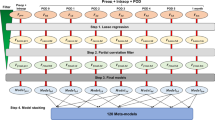Abstract
Purpose
To evaluate which factors affecting changes in postoperative renal function after conducting radical nephrectomy or partial nephrectomy.
Methods
Data on patients who underwent operations for renal cell carcinoma between 2000 and 2010 at multiple institutions were collected. Patient characteristics including preoperative estimated glomerular filtration rate (EGFR) were investigated, and types of surgery and postoperative results were evaluated. Renal insufficiency was defined as an EGFR <60 ml/min/1.73 m2. Cox proportional hazard regression analysis was used to investigate which factors were associated with chronic renal insufficiency after surgery.
Results
A total of 2,454 patients were included for evaluation; 1,502 patients underwent radical nephrectomy, whereas 952 patients underwent partial nephrectomy. The mean follow-up period was 44.48 ± 27.04 months (range, 12–120 months). Factors affecting EGFR were age, diabetes, hypertension, surgical procedure, and preoperative creatinine level (p < 0.001). Factors affecting postoperative renal insufficiency were age, surgical procedure, serum creatinine level, and EGFR.
Conclusion
The risk for developing post-nephrectomy renal insufficiency in patients who underwent radical nephrectomy was higher than those who underwent partial nephrectomy. Factors affecting post-nephrectomy renal insufficiency were age, preoperative serum creatinine level, and preoperative EGFR. In addition to radical nephrectomy, patient >58 years with a preoperative serum creatinine >1.03 mg/ml, and EGFR <73 ml/min/1.73 m2 had a higher probability of developing post-nephrectomy chronic renal insufficiency.
Similar content being viewed by others
References
Weight CJ, Larson BT, Fergany AF et al (2010) Nephrectomy induced chronic renal insufficiency is associated with increased risk of cardiovascular death and death from any cause in patients with localized cT1b renal masses. J Urol 183(4):1317–1323
Huang WC, Levey AS, Serio AM et al (2006) Chronic kidney disease after nephrectomy in patients with renal cortical tumours: a retrospective cohort study. Lancet Oncol 7(9):735–740
Lau WK, Blute ML, Weaver AL et al (2000) Matched comparison of radical nephrectomy vs nephron-sparing surgery in patients with unilateral renal cell carcinoma and a normal contralateral kidney. Mayo Clin Proc 75(12):1236–1242
Levey AS, Perrone RD, Madias NE (1988) Serum creatinine and renal function. Annu Rev Med 39:465–490
Levey AS, Bosch JP, Lewis JB et al (1999) A more accurate method to estimate glomerular filtration rate from serum creatinine: a new prediction equation. Modification of Diet in Renal Disease Study Group. Ann Intern Med 130(6):461–470
Jemal A, Siegel R, Xu J et al (2010) Cancer statistics, 2010. CA Cancer J Clin 60(5):277–300
Kates M, Badalato GM, McKiernan JM (2011) Renal functional outcomes after surgery for renal cortical tumors. Curr Opin Urol 21(5):351–355
Lewis J, Agodoa L, Cheek D et al (2001) Comparison of cross-sectional renal function measurements in African Americans with hypertensive nephrosclerosis and of primary formulas to estimate glomerular filtration rate. Am J Kidney Dis 38(4):744–753
Hollenbeck BK, Taub DA, Miller DC et al (2006) National utilization trends of partial nephrectomy for renal cell carcinoma: a case of underutilization? Urology 67(2):254–259
Stephenson AJ, Hakimi AA, Snyder ME et al (2004) Complications of radical and partial nephrectomy in a large contemporary cohort. J Urol 171(1):130–134
Shirasaki Y, Tsushima T, Saika T et al (2004) Kidney function after nephrectomy for renal cell carcinoma. Urology 64(1):43–47 (discussion 8)
Song C, Park S, Jeong IG et al (2011) Followup of unilateral renal function after laparoscopic partial nephrectomy. J Urol 186(1):53–58
Jeon HG, Gong IH, Hwang JH et al (2012) Prognostic significance of preoperative kidney volume for predicting renal function in renal cell carcinoma patients receiving a radical or partial nephrectomy. BJU Int 109(10):1468–1473
Barlow LJ, Korets R, Laudano M et al (2010) Predicting renal functional outcomes after surgery for renal cortical tumours: a multifactorial analysis. BJU Int 106(4):489–492
Levey AS, Coresh J, Balk E et al (2003) National Kidney Foundation practice guidelines for chronic kidney disease: evaluation, classification, and stratification. Ann Intern Med 139(2):137–147
Malcolm JB, Bagrodia A, Derweesh IH et al (2009) Comparison of rates and risk factors for developing chronic renal insufficiency, proteinuria and metabolic acidosis after radical or partial nephrectomy. BJU Int 104(4):476–481
Suer E, Burgu B, Gokce MI et al (2011) Comparison of radical and partial nephrectomy in terms of renal function: a retrospective cohort study. Scand J Urol Nephrol 45(1):24–29
Acknowledgments
This study was supported by ‘Life Respecting Fund donated by Kim Jong-Nam’ of Seoul St. Mary’s Hospital, The Catholic University of Korea.
Conflict of interest
The Authors have stated that they have no conflicts of interest.
Author information
Authors and Affiliations
Corresponding author
Rights and permissions
About this article
Cite this article
Choi, Y.S., Park, Y.H., Kim, YJ. et al. Predictive factors for the development of chronic renal insufficiency after renal surgery: a multicenter study. Int Urol Nephrol 46, 681–686 (2014). https://doi.org/10.1007/s11255-013-0534-8
Received:
Accepted:
Published:
Issue Date:
DOI: https://doi.org/10.1007/s11255-013-0534-8




